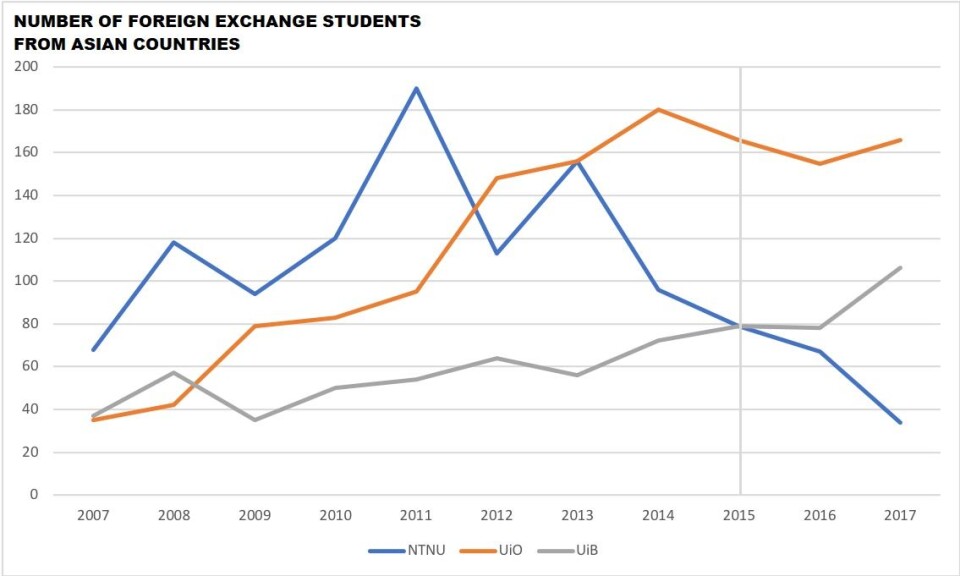
English language requirements a hindrance to exchange students
NTNU increasing the requirements for incoming foreign exchange students has led to a decline in applicants, affecting Asian students in particular.
Tekst: Jesper Nohr. Oversatt av: Benedikt Javorovic, Lovise Finnøy
In 2015 NTNU increased English language skill requisites for exchange students. This now applies to those arriving to do parts of their bachelor’s or master’s degree. From the spring semester of 2015 the requirements for these students were raised to the same level as foreign students applying for a full master’s degree at NTNU.

– The results required from the Test of English as a Foreign Language and International English Language Testing System are considerable higher than the requirements at the University of Oslo (UiO) and the University of Bergen (UiB), explains Professor in Political Science, Paul Midford, at NTNU.

Midford works closely with foreign exchange students, especially from Japan. He says these students have become scarce since the implementation of the new English language requirements. He believes that the requirements set at UiO and UiB are more reasonable.
The professor opines that the foreign exchange students applying for a full education in Norway are faced with a lower demand for English skills (the same as UiO) than the exchange students arriving at NTNU to do parts of their degree.
Debatt: – En utveksling til besvær
Turning heads among Japanese professors
– NTNU formerly had lower requirements. The best solution would be something between the current state and the former. With these heightened requirements, we will lose promising exchange students, and they will apply to Oslo or Bergen. It could also mean loss of exchange opportunities for our own students.
The professor of Political Science, now also the leader of the NTNU Japan program, explains that there were no requirements for bachelors students arriving before 2015. When these requirements were implemented, the number of exchange students dropped, especially from Asian countries.
– My suggestion is that we keep our requirements at the same level as Oslo. This will allow people to study at NTNU, while we still have the possibility of limiting certain classes based on language proficiency. It is also possible for the students to start a dialogue with the professors before they are allowed to exchange, Midford concludes.
Trygve Thomessen is the CEO at the technological firm PPM AS, as well as a part time professor at the University in Budapest and guest lecturer at Chuo University in Japan. He is the industry representative at the Japan program at NTNU, and visits Japan five to six times a year. Thomessen has witnessed the commotion the increased English requirements has caused at universities in Japan.
– I have talked to professors at Chuo University, and they are unsure whether the new requirements are desirable.
See also: A survival guide to Trondheim
Communication more important than formal requirements
He believes that both the Japanese and the Norwegians can learn a great deal from each other, in academic terms as well as cultural. Thomessen reasons that the English language requisites could be lowered if a teacher, lecturer, or counsellor invests time in understanding how the Japanese think.
– Despite being able to speak perfect English to a Japanese person, they will lose track of the conversation without basic understanding of Japanese communicational norms. The process of choosing candidates for the PhD-program ought to be done through email or conversations over Skype. It is incredible how much one is able to extract from people if you invest in them socially.
Thomessen says students on a bachelor’s and master’s level should take standardized tests, as opposed to students arriving on a PhD program. He believes the requirements of these test are too high, and that the Japanese exchange students are a great resource if one takes the time to learn their way of communication.
– It is not common for Norwegian students to study in Japan. So I do not believe that the increased requirements will have any impact on their possibilities. That flow of students will exist no matter what, Thomessen says.
– Poor communication can lead to accidents
Higher Executive Officer Sigrid Hauge, at NTNU Office of International Relations asserts that the English requirements were established based on feedback from the academic community. They reported that some of the students did not possess the necessary language skills to participate in class.
– This proved to be a problem, particularly when the students had to work in groups, and their performance suffered due to a lack of language skills. In laboratory work, the risk of accidents increase a great deal if students are unable to receive instructions and fail to communicate.
She argues that the most practical solution is to impose the same requirement on everyone, considering that most foreign exchange students enroll in classes on a master’s level. Hauge admits that this has caused a decreased number of exchange students from certain countries, particularly Asian countries.
– This decline happened because these students do not possess the language skills to pass the test with the score expected by NTNU, Hauge explains.
Will not impact cooperation with Asian universities
The Office of International Relations wants to maintain the language demand. Acting Executive Officer Trond Singsaas at International Section does not believe Midford is correct in saying that the increased requirements will impact collaboration with Asian Universities.
– It is impossible to derive any numbers supporting this claim. NTNU is seeking good students, and in order for that to happen, one has to find a good balance between the quantity and quality. We have no reason to believe that our prerequisites have any negative effects for students from NTNU and their possibilities to travel to other countries’ universities, states Singsaas.
Furtheremore, Singsaas informs that when we look at the collected number of asian exchange students for all three universities in Norway, we can detect an increase in recent years. The number of incoming students to NTNU, however, is almost back to the earliest recorded levels.
– I do not think the decline in asian exchange students to NTNU can be directly linked to the new English requirements. There has been a steady decline that is likely to have alternative explanations, Singsaas concludes.

































